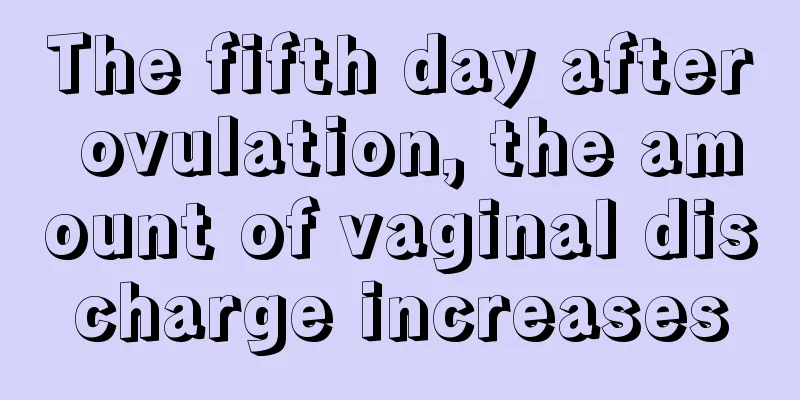The fifth day after ovulation, the amount of vaginal discharge increases

|
For couples who want to have children, women should always pay attention to their leucorrhea and menstrual conditions, and understand their ovulation period and safe period. During the ovulation period, the possibility of women getting pregnant will increase, while during the safe period, the possibility of pregnancy will also decrease. On the fifth day after ovulation, many women have experienced an abnormal increase in leucorrhea, but most people are confused. What is going on? Some women have sex during their ovulation period and experience increased vaginal discharge. It is impossible to determine whether they are pregnant because not every sex during the ovulation period will allow the sperm and egg to combine. Sometimes women may have gynecological inflammation that affects pregnancy and leads to pregnancy failure. When a woman has increased vaginal discharge, other symptoms should be considered to see if she will have amenorrhea, and whether the color and nature of the vaginal discharge will change. Only through these combinations can we know whether the woman is pregnant. Having sex during the ovulation period is the time when women are most likely to get pregnant. The chance of conception is highest during this period, but it is impossible to determine whether a woman is pregnant by the increase in vaginal discharge after sex, because sometimes the increase in vaginal discharge is a sign of premenstruation, and sometimes the increase in vaginal discharge is related to gynecological inflammation. If a woman wants to know whether she is pregnant, she can determine it through a blood test. Why does the amount of vaginal discharge increase after ovulation? It is normal to have more vaginal discharge after ovulation. Generally, the amount of vaginal discharge will increase during ovulation. The condition of thin vaginal discharge is due to the influence of hormonal changes in the body after ovulation. The estrogen level in the body will decrease after ovulation. Generally speaking, if the leucorrhea is transparent, has no odor and does not itch, it is normal. This situation will generally not exceed 5 days, so you just need to observe it closely. Therefore, even if the amount of leucorrhea increases after ovulation, it does not mean that you are pregnant simply because of the increase in leucorrhea after ovulation. There may be other reasons. Generally speaking, if you want to confirm pregnancy, you can test it at home with a pregnancy test strip, or go directly to the hospital for a blood hcg test. |
<<: Will the amount of vaginal discharge increase during the first week of pregnancy?
>>: It is easy to get pregnant but the fetus always stops
Recommend
If you want to lose weight, you should eat well first.
Losing weight, or more scientifically called &quo...
Treatment for sweating fits
Many times, due to the lack of elements in the hu...
Belly throbbing in late pregnancy
Many expectant mothers are very excited in the la...
Are endometrial adhesions serious?
The health of the endometrium has a great impact ...
Is it difficult to get pregnant during menstruation?
Menstruation comes once a month, which can also d...
Uncontrollable anger before menstruation
Can't control your temper before menstruation...
How long does it take for a woman to have an IUD inserted?
In life, many women choose to have an IUD inserte...
Why didn't Anita Mui have surgery?
Anita Mui is a film and television actress and si...
What are the symptoms of low corpus luteum?
The corpus luteum is a progesterone secreted by w...
What is the cause of black menstrual blood?
Women often encounter abnormal menstruation in th...
How harmful is it to have sex during menstruation?
Do not have sex during menstruation because women...
There are bumps on the vulva and anus
The area between the anus and the private parts i...
How to restore uterine contraction
Pregnancy causes certain damage to a woman's ...
What are the drugs for treating abnormal leucorrhea?
We all know that leucorrhea can be said to be a b...
What are the reasons for missed menstruation?
There are many reasons for amenorrhea, pregnancy ...









